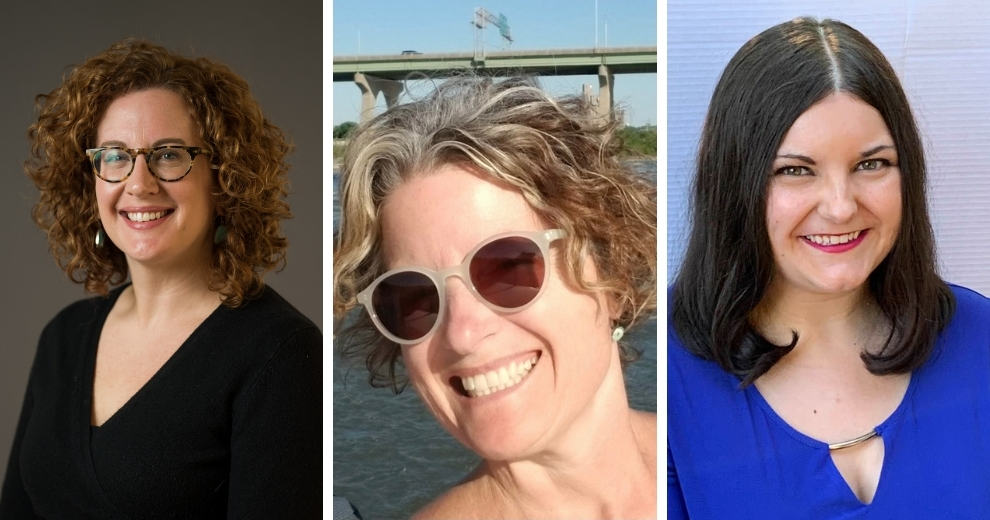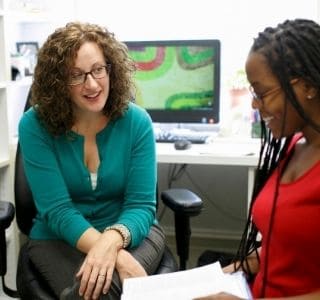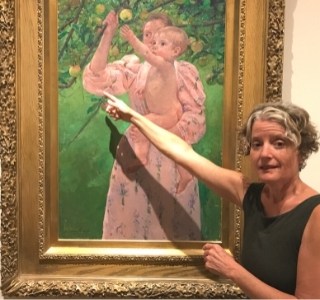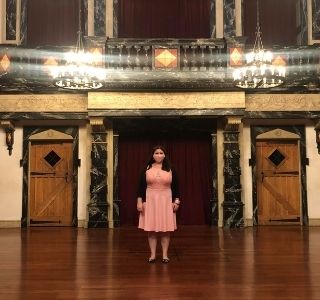MBU’s Excellence in Teaching awards debuted in 2019 to recognize the dedication and craft that stand at the very core of the university.
After an especially challenging year in the classroom, both in-person and virtual, the university community celebrates recipients of the 2021 awards, who share below what they love about their profession and thoughts about their teaching philosophy.

Faculty Excellence in Teaching Award:
Associate Professor of Anthropology Abigail “Abby” Wightman

Abby Wightman began at Mary Baldwin in fall of 2009 and teaches a wide variety of anthropology courses, from introducing students to basic anthropological concepts in Cultural Anthropology to working with sociology and anthropology majors and minors in Social Theory. Her own research background and specialty is in Native North American cultures, and she completed her BA at Miami University and her MA and PhD at the University of Oklahoma.
On teaching and working with students at MBU
“I feel extremely fortunate to be able to teach anthropology at Mary Baldwin, which means that I also get to work very closely with students. I always tell people that I loved being in college so much that I never left. In order to do my job, to be a good professor and teacher, I have to read, write, and do research — all the things I loved about being in college. I think of it as a great privilege that I get to make a living by reading and researching things that I find fascinating and then getting to tell other people about them.
As an anthropologist, I am also passionate that what I teach, the subject matter, is incredibly important, even necessary, to the world we live in. At the heart of anthropology is the celebration of diversity and recognition of human equality. In other words, although humans have different cultures and beliefs, all human societies and cultures are equally valid expressions of human creativity and adaptation. My courses are centered around these ideas and I hope that when students complete them, they take away specific skills and perspectives about how to work with people and communities different from themselves and how to understand the complex communities we live in.”
On her teaching philosophy and approach
“I like to mix it up! I love to teach through expectation failure — that is, getting students to learn something by first having them consider what they expect and walking them through step by step, with data, why their expectation is incorrect. I also teach through application, and I think learning by doing is incredibly important.
In one of my classes, students work in groups all semester to create their own invented communities and then we have a big simulation toward the end of the course. The assignment requires students to follow basic rules about how societies are organized and how different cultural elements correlate. They get to be creative and have fun, but they also need to show me that they understand the underlying concepts.
Philosophically, I try to practice inclusive, student-centered, and critical pedagogies. These are methods and concepts that focus, in part, on allowing students to share some power in the classroom and for professors to see themselves as co-learners, which I try (and sometimes fail) to do.”
Words of celebration from Wightman’s dean, Martha Walker
“There is no doubt that Abby merits this recognition, and I am really pleased to see her receive it. Her enthusiasm for and commitment to her students characterize every aspect of her work with Mary Baldwin. She guides students to a better understanding of human cultures and ultimately of themselves. In the process they learn appreciation of difference and tolerance. They also learn to reflect and to communicate thoughtfully. Students who have taken anthropology classes with Abby leave Mary Baldwin prepared to contribute valuably to the communities in which they will find themselves, and they consistently credit her part in their success.”
— Martha Walker, dean of the College of Arts and Sciences
Faculty Excellence in Online Teaching Award:
Assistant Professor of Art History Kerry Mills

After joining MBU part-time 25 years ago, Kerry Mills now teaches art history courses including surveys, Women in Visual Arts, American Art and Architecture, and Modern Art. With a research specialty in modern and 20th century American art, Mills received her bachelor of arts, bachelor of fine arts, and master of arts from Virginia Commonwealth University.
On teaching and working with students at MBU
“Teaching art history at MBU truly brings me joy. When reluctant students begin a semester, letting me know they are not artists and have not ever been interested in art, and then reflect at the end of the semester proclaiming a new-found passion and understanding, I know I have done the hard work. The most fulfilling part of my teaching is developing a learning community in my courses while on a virtual platform.
My teaching at MBU has been one committed to reflect evolving pedagogies; changing educational climates; developing and changing technologies; the needs of my students; building relationships with my students and advisees; the act of listening; as well as what is happening in the world as it relates to the discipline of art history.”
On her teaching philosophy and approach
“My practice of teaching is always moving forward — I see my teaching as a living being with fluid walls able to expand, bulge, and contract as needed. And since my courses are fluid, I am always tweaking them so they stay fresh for me.
I am committed to the idea that our courses across the university should be engaging with the time in which we live — the climate of learning is always changing and so depends on the students and their experiences. I consider all of this to ensure I do not silo the studies and ignore the real world implications on the field of art history. This year has been one for considering opening up dialogues to further move the field beyond a Eurocentric and Post Colonial one. This requires examining my course content and reframing it as needed.”
Words of celebration from Mills’ dean, Paul Menzer
“Kerry Mills is a model educator, a model not only to her students but her colleagues who look to her for information and inspiration about best practices in online teaching. Never has this been more vital than the past academic year, when so many faculty embraced virtuality and hybridity out of necessity. Kerry was always there for her colleagues with calm, compassionate, and competent counsel. She is extraordinarily deserving of this honor, and I’m delighted to see receive it.”
— Paul Menzer, dean of the College of Visual and Performing Arts
Graduate Teaching Fellow
Excellence in Teaching Award:
Amanda M. Rogus MLitt ’19 MFA ’21

While earning her second degree in Shakespeare and Performance this past May, Amanda M. Rogus served as a teacher for two semesters of English 102: College English, an introductory writing course for MBU’s English department. A native of Pittsburgh, Rogus earned her undergraduate degree from Wittenberg University in Springfield, Ohio, double majoring in theatre and English.
On her plans after graduating from MBU with her master of fine arts
“I received one of two coveted fully funded doctoral slots at the University of Washington’s Theatre History and Criticism PhD program. This program is one of the best programs in the country to study theatre history. It was my top choice so Mary Baldwin helped me get into my dream doctoral program. I also received a substantial provost scholarship to do international research for my dissertation. I am thrilled to spend the next four years in Seattle pursuing my dreams.”
On her goals for the future
“My ultimate goal is to teach at the college level, but I want to make an impact by teaching not only course content but life lessons. I seek to make a difference in each of my students’ lives in each class. To me teaching is a vocation and an honor, and I hope to never lose that spirit or attitude.”
Words of celebration from Rogus’ dean, Paul Menzer:
“I had the opportunity to watch Amanda teach in fall 2020, and it was one of the best days of a challenging year. Focused, impassioned, dynamic, and engaged, Amanda is precisely the kind of teacher you would wish for any first-year composition student. In Amanda, these students had a mentor and a model, a peer and a paragon in the foundational endeavor of academic writing.”
— Paul Menzer, dean of the College of Visual and Performing Arts